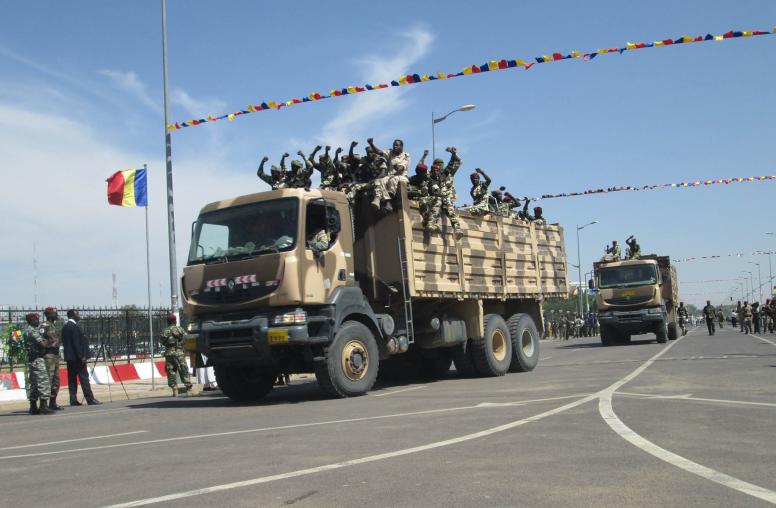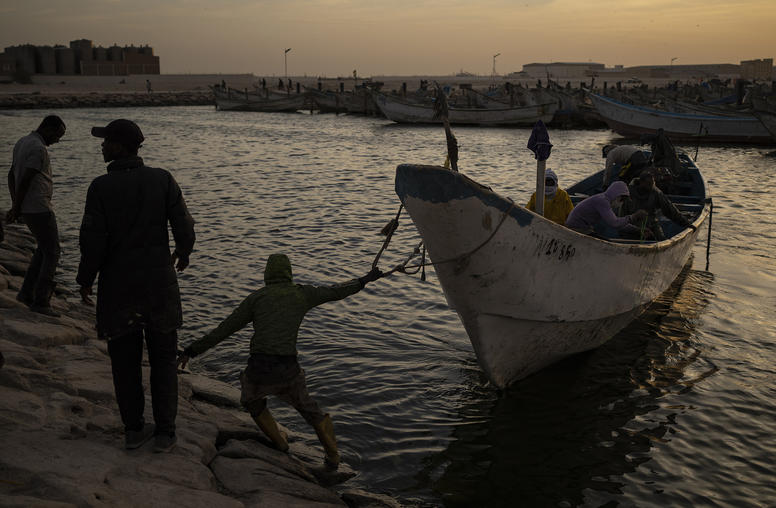Chad’s Political Transition Might Be Its Last Shot for Democracy and Peace
With a climate of uncertainty hanging over the transition, the outcome will have major implications far beyond Chad’s borders.
The state of Chad’s political transition is not reassuring. Despite some signs of progress during the National Inclusive and Sovereign Dialogue (DNIS) last October, security forces engaged in violent crackdowns of protests shortly afterward — killing dozens of civilians. Meanwhile, now-President Mahamat Idriss Déby has moved to consolidate power ahead of elections planned for October 2024, leaving opposition and civic groups worried that Déby may not turn power over to a civilian government.

Regionally, Chad is also in a precarious situation. After civil conflict erupted in neighboring Sudan in April, refugees began crossing the border to flee from the fighting. To the north, Libya’s political instability has rippled across the desert border. And in the Sahel, violent extremism continues to threaten regional security.
The University of N’Djamena’s Gondeu Ladiba examines the main obstacles facing Chad’s transition going forward, how it affects the surrounding region, and whether there are any openings for progress that the United States and international partners can help facilitate.
What are the key challenges and obstacles of Chad’s transition? What is needed to advance a peaceful and inclusive transition, and how does this matter for citizens in Chad?
Since the Transitional Military Council (TMC) took power in April 2021, the primary concern of its supporters seems to be the preservation of power rather than true reconciliation among Chadians.
The distribution of power remains personal, based partly on family clan ties, and has led to increased fields of contestation, conflicts and violence. Chad’s transitional institutions appear to be caught between the current ruling political party — the Patriotic Salvation Movement (MPS) — and the tribal network of support, including within the military, that surrounds Transitional President Mahamat Idriss Déby, with both sides focused on preserving their own power throughout the transition.
This is a fundamental mistake, especially considering the unstable security environment in Chad and the region.
After their refusal to sign the Doha Accords in August 2022, the rebel group Front for Change and Concord in Chad has, for the most part, retreated to their rear base in Libya. Meanwhile, some rebel groups are carrying out skirmishes in northern Chad, often resulting in the loss of human lives, despite also calling on the Chadian government to engage in negotiations for a comprehensive peace.
These rebel movements are also reportedly fighting alongside the Rapid Support Forces in neighboring Sudan, highlighting the complexity and volatility of the regional security environment — and raising questions about these actors’ intentions to promote peace. It appears as though the actors involved in Chad believe they may have more to gain individually by continuing hostilities than by pursuing reconciliation in earnest.
Meanwhile, most Chadians face complete disillusionment. A significant portion of citizens do not recognize themselves in the process that led to the DNIS, let alone what came afterward. For many, this dialogue was a big mess in which the ruling party’s supporters maneuvered to tighten their grip and suppress the participants’ freedom of expression.
Chad needs to build a stable internal political alliance. That said, Chad’s political trajectory looks like a game of “hide and seek” among the different actors engaged in it. The behaviors of its main actors are predominantly characterized by mistrust and cacophony, and a climate of uncertainty hangs over a peaceful and democratic outcome to the process.
Opposition voices have quieted as the transition process has gone on — notably due to the shrinking space for public dialogue and crackdowns, especially since the October 2022 massacre of opponents and civil society activists by Chad’s security forces.
Mistrust aside, the lack of transparency in the process has left some researchers and institutions wondering if the country is truly in transition. Therefore, it’s not an exaggeration to predict that the country might experience a series of crises more severe than it’s faced in the past should this transition fail.
In fact, some political actors argue that this transition is the last chance for Chadians to choose their destiny. Either the transition succeeds through a free and transparent election where Chadians can express their choices for the form of the state and republican institutions, or it fails, and all the disparate actors will go their separate ways, possibly taking up arms against one another.
How does Chad’s transition fit into wider trends in the Sahel and Central Africa, and why is a peaceful transition relevant to regional security and stability?
The regional environment is of great concern, with significant insecurity and political instability in Sudan, the Central African Republic and the Lake Chad Basin — where Boko Haram has been active for more than a decade.
Meanwhile, Chad’s porous borders with Libya to the north have given rise to illicit gold extraction activities, trafficking of contraband and human smuggling. Therefore, a peaceful political transition in Chad is critical to avoid more violence that could spill over into Chad’s neighbors, many of which already struggle with insecurity.
With respect to regional stability, Chad has been seen as a buffer zone — a vital security stronghold against jihadist threats in the Sahel region. This was the justification behind the international support enjoyed by former President Idriss Deby Into, despite his authoritarian government.
Since his sudden death in 2021, and his son’s ascension to power, this trend has continued, with Chadian armed forces playing a crucial role in countering internal and external threats alike, including rebel movements, jihadist activities in the Lake Chad Basin, and simmering instabilities on Chad’s borders (now including Sudan).
Are there windows of opportunity or encouraging signals for the transition? If so, how can Chadians and international partners like the United States capitalize on them?
It is important to clarify that this analysis of the Chadian transition is focused on the quality rather than the quantity of actions taken. It is not to say that the transition has done nothing — rather, it is accomplishing a lot. But these moves do not receive the approval of most Chadian stakeholders, especially from the political opposition and aspects of civil society.
Looking back, it can be argued that U.S. interests in Chad has been based on two pillars: cultural diplomacy that promotes the English language, American culture, and academic and university exchanges on the one hand; and military partnerships, driven by the fight against terrorism, that involve the regular provision of equipment and training for the Chadian defense and security forces on the other.
However, U.S. engagement in Chadian domestic politics can often be seen as timid, with policy primarily expressed through denouncement statements or condemnations. More direct and assertive support by the United States for democracy, freedom of expression and assembly, and good governance — including meaningful sanctions against those undermining democracy and the rule of law in Chad — would be desirable in the face of an increasingly unjust, authoritarian and exclusive system in Chad.
Given the opaque transitional process and systematic repression of dissenting voices in Chad, it is crucial for partners to clearly stand with the Chadian people. The current trajectory poses real risks for political complications in the medium and long term. Citizen action is currently polarized regarding the form of the state — whether it will be a unitary of federalist political system — but no organized debate exists to allow both sides to express their views in a democratic fashion. A nonconsensual process cannot guarantee lasting peace.
That said, things are progressing at the government’s pace, and this is the moment for Chad's partners to call on the government to respect its commitments and initiate a transparent and inclusive process to rebuild the Chadian nation. Specifically, it is crucial for Chad's partners to continue exerting pressure on the transitional president, urging him to have the courage to widen civic space and trust in the Chadian people to pave the way for genuine peace.
Gondeu Ladiba is a professor of anthropology and social sciences at the University of N’Djamena and an independent expert on Chad and regional politics.



